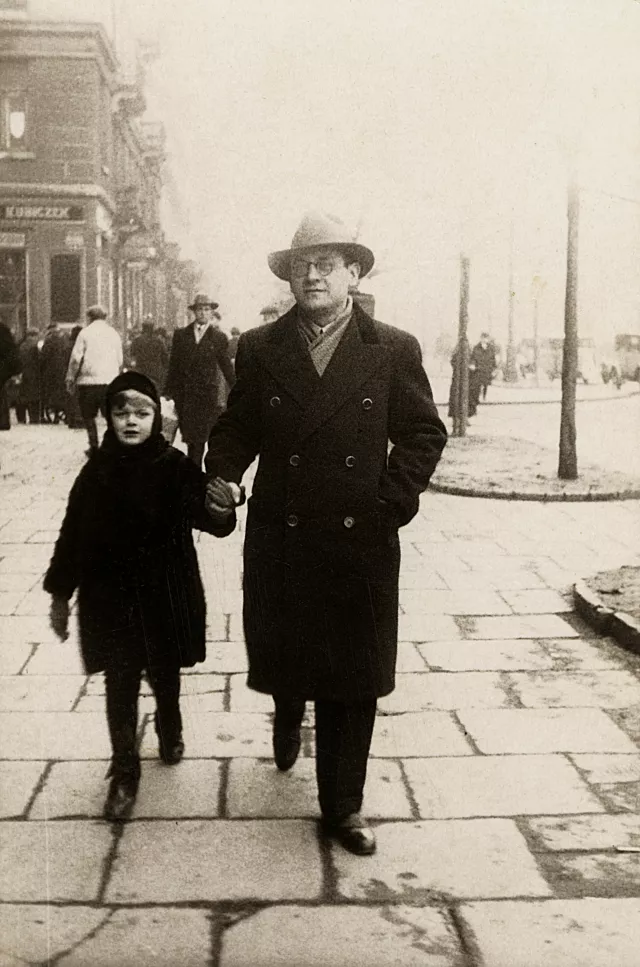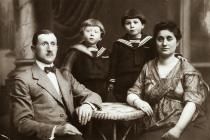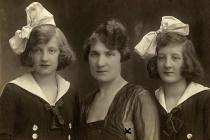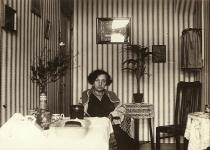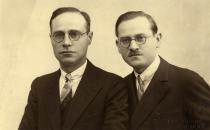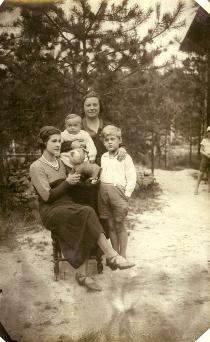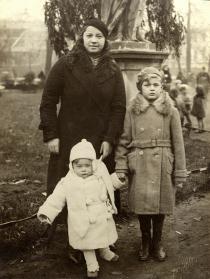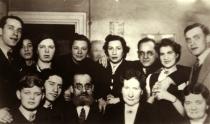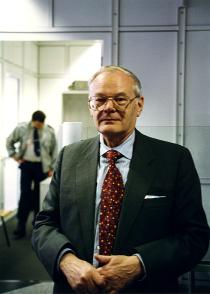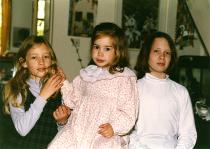Wacek Kornblum with his father Szlomo in Warsaw’s Jerozolimskie Avenue
This is me and my dad on Jerozolimskie Avenue, on Saturday, 25th March 1932. And there’s a dedication written in Yiddish by myself: ‘Shabes, dem 25 merts, far tshyotshye Emilye, Manie, Izio Kornblum.’ - ‘For aunts Emilia and Mania’
Father was born in 1894. I remember when Dad used to sit and write, I remember his handwriting. He wrote by hand, very specific handwriting, so that where there were long Nun, Chet [at the end of a word], there was a thick line. And he wrote on sheets of lined paper, but folded in half in such a way that there were thin stripes of paper.
Dad was a writer and he wrote a few books. It's not big literature, but it's prose with a large poetic load, so descriptions, accounts of events. He also used to write to Jewish magazines, to Folkshtime, to the newspaper Haynt, to the newspaper Radio, that was an afternoon newspaper, and to the newspaper Moment. He belonged to a Union of Jewish Writers in Warsaw, on 13 Tlomackie Street, where he used to take me to as a child, where Itzik Manger also used to come. Some of Itzik Manger's poems I remember today, and when Father took me there, I used to sit in his lap and recite. I met Itzik Manger later in Israel on 'Di Megle' show, but he was quite old then already and didn't remember anything.
I often played in front of the house. Once they bought me a scooter, a good one, massive, wooden, it had rubber wheels. And I used to let myself ride it on the road. There was never heavy traffic on Sliska Stret and once a navy-blue policeman came by and took that scooter from me. I, of course, ran home and Dad went with me to the police station, at the police station they said: 'Yes, we have it, but you have to go to the constable on Grzybowski Square, he directs traffic there.' So Dad and I went there from Sliska Street to Grzybowski Square, he stood on a platform in the middle of the road, we went up to him, Dad told him what we came for: 'That's 10 zloty'. So Dad took out 10 zloty, that was a huge amount of money, gave it to him, we went back to the police station and I got my scooter back.
My dad was anti-religious. Never in my life did I go to a service in a synagogue, not even on Yom Kippur. There were holidays present in our life, because there were generally holidays in the Jewish world: Rudele closed her store, Dad didn't work, the shop was closed. And we went to visit the family.
I need to say that Dad was by nature a very good person .Very sincere, warm-hearted, very sensitive, and - it stuck with me since I was very young - he always helped people. He used to help other artists, kept giving to Aunt Chawcia, organized bread delivery for Jewish writers in the ghetto. In the later period in the ghetto, when there was horrible poverty, and children wandered about on streets and died on sidewalks, they used to also beg. A young boy used to come to Niska where we lived and shout: 'A stikele broyt', 'A piece of bread'!. And Father once brought him upstairs, fed him, found a flat box with a string that he could hang on his neck, and I don't know how, but bought him a box of candy to sell. And he came by a couple times, and finally he came once and said he'd eaten all the candy.
